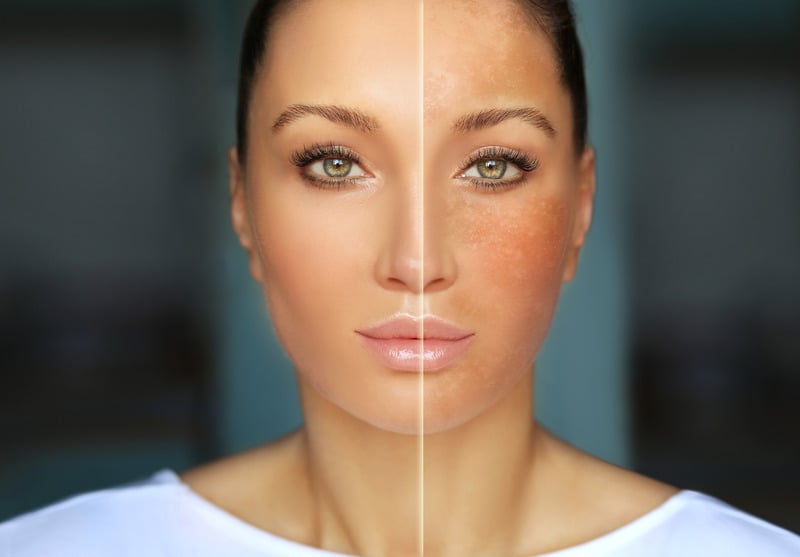Hyperpigmentation is a common skin issue that many people face. It happens when some parts of your skin become darker than the rest. This can be due to various reasons like sun exposure, acne scars, or even hormonal changes. But don’t worry! There are ways to fade these dark spots and achieve an even skin tone. Let’s dive into some simple and effective methods.
What is Hyperpigmentation?
Hyperpigmentation is when your skin produces too much melanin, the pigment that gives your skin its color. This can result in dark spots or patches on your skin. These spots can appear anywhere on your body but are most common on the face, hands, and other areas frequently exposed to the sun.
Causes of Hyperpigmentation
- Sun Exposure: The sun’s UV rays can increase melanin production, leading to dark spots.
- Inflammation: Skin injuries like cuts, burns, or acne can leave dark marks after they heal.
- Hormonal Changes: Conditions like melasma are often triggered by hormonal changes, especially during pregnancy.
- Medications: Some drugs can cause dark spots as a side effect.
How to Fade Dark Spots
1. Sun Protection
Sun protection is crucial when dealing with hyperpigmentation. Dr. Doris Day, a board-certified dermatologist, emphasizes that “Sun protection is non-negotiable when combating hyperpigmentation. UV rays contribute to melanin production, so wearing sunscreen daily and seeking shade during peak sun hours is essential” (Interview with Dr. Day on a beauty website). Always use a broad-spectrum sunscreen with at least SPF 30. Wear hats and sunglasses to protect your face from direct sunlight.
2. Over-the-Counter Products
There are many over-the-counter products that can help lighten dark spots. Look for ingredients like:
- Vitamin C: This antioxidant helps brighten the skin.
- Niacinamide: Reduces inflammation and lightens dark spots.
- Hydroquinone: A strong skin-lightening agent.
Dr. David Lortscher, a board-certified dermatologist, notes that “While many over-the-counter products can be effective for mild hyperpigmentation, seeing a dermatologist can unlock more targeted solutions” (Article on Curology website).
3. Professional Treatments
For stubborn dark spots, professional treatments might be necessary. Some options include:
- Chemical Peels: These remove the top layer of skin, revealing fresher skin underneath.
- Laser Therapy: Targets dark spots with focused light.
- Prescription Medications: Stronger than over-the-counter options, these can be very effective.
Dr. Jennifer Linder, a board-certified dermatologist, explains that “Hyperpigmentation is often a symptom of underlying inflammation, so addressing the root cause is crucial for achieving lasting results” (Website of Dr. Linder’s Dermatology Practice).
4. Patience and Consistency
Treating hyperpigmentation takes time. Dr. Kavita Mariwalla, a board-certified dermatologist, advises that “Patience is key when treating hyperpigmentation. It can take several weeks or even months to see noticeable results. Consistency in your skincare routine and treatment plan is critical for long-term success” (Article on Dr. Kavita’s Skincare blog).
Personal Experience
I remember when I first noticed dark spots on my cheeks. It was frustrating because no matter what I tried, they wouldn’t go away. I started using a vitamin C serum every morning and a niacinamide cream at night. I also made sure to wear sunscreen daily. After a few months, I saw a significant improvement. The spots faded, and my skin tone became more even. It took time and patience, but it was worth it.
Studies on Hyperpigmentation
Topical Tranexamic Acid
A study titled “Efficacy and Safety of Topical Tranexamic Acid for Melasma: A Randomized, Double-Blind, Placebo-Controlled Trial” published in the Journal of the American Academy of Dermatology in 2015 found that topical tranexamic acid was effective in reducing melasma pigmentation and was well-tolerated by the participants.
Intense Pulsed Light Therapy
Another study, “The Effectiveness of Intense Pulsed Light Therapy for the Treatment of Melasma,” published in the Journal of Cosmetic and Laser Therapy in 2017, concluded that intense pulsed light therapy is an effective treatment option for melasma, offering significant improvement in pigmentation and overall skin tone.
Simple Tips for Even Skin Tone
- Stay Hydrated: Drink plenty of water to keep your skin hydrated and healthy.
- Eat a Balanced Diet: Foods rich in vitamins and antioxidants can help improve your skin’s appearance.
- Get Enough Sleep: Rest is essential for skin repair and regeneration.
- Avoid Picking at Your Skin: This can cause inflammation and lead to dark spots.
Conclusion
Hyperpigmentation can be a challenging issue, but with the right approach, you can fade dark spots and achieve an even skin tone. Remember to protect your skin from the sun, use effective over-the-counter products, consider professional treatments if needed, and be patient. Your skin will thank you for it!
By following these simple steps and staying consistent, you’ll be on your way to brighter, more even-toned skin. Don’t forget to consult with a dermatologist for personalized advice and treatment options. Happy skincare journey!




